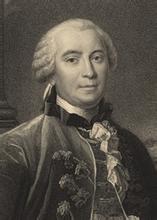(单词翻译:单击)
One of the better early attempts at dating the planet came from the ever-reliable Edmond Halley, who in 1715 suggested that if you divided the total amount of salt in the world's seas by the amount added each year, you would get the number of years that the oceans had been in existence, which would give you a rough idea of Earth's age. The logic was appealing, but unfortunately no one knew how much salt was in the sea or by how much it increased each year, which rendered the experiment impracticable.
在确定这颗行星的年龄的问题上,早期有个比较合理的看法。它是由始终可靠的埃德蒙·哈雷提出来的。1715年,他提出,要是你把全世界海洋里的盐的总量,除以每年增加的量,你就会得出海洋存在的年数,从而可以大致知道地球的年龄。这个道理很吸引人,但不幸的是,谁也不知道海洋里究竟有多少盐,也不知道每年到底增加多少,这就使得这项实验无法付诸实施。

The first attempt at measurement that could be called remotely scientific was made by the Frenchman Georges-Louis Leclerc, Comte de Buffon, in the 1770s. It had long been known that the Earth radiated appreciable amounts of heat—that was apparent to anyone who went down a coal mine—but there wasn't any way of estimating the rate of dissipation.
第一次称得上比较符合科学的尝试是由法国的布丰伯爵乔治-路易·勒克莱尔进行的,那是在18世纪70年代。很长时间以来,大家都知道,地球释放出相当可观的热量——下过煤矿的人都清楚——但是,没有办法来估计散逸率。
Buffon's experiment consisted of heating spheres until they glowed white hot and then estimating the rate of heat loss by touching them (presumably very lightly at first) as they cooled. From this he guessed the Earth's age to be somewhere between 75,000 and 168,000 years old. This was of course a wild underestimate, but a radical notion nonetheless, and Buffon found himself threatened with excommunication for expressing it. A practical man, he apologized at once for his thoughtless heresy, then cheerfully repeated the assertions throughout his subsequent writings.
布丰在实验过程中先把球体加热到白炽的程度,然后在其冷却的过程中用触摸的办法(可能开头是轻轻的)来估计热的损耗率。根据这项实验,他推测地球的年龄在75000——168000年之间。这当然是大大地低估了;但是,这是一种很激进的见解。布丰发现,要是把这见解加以发表,他有被开除教籍的危险。他是个讲究实际的人,连忙为自己缺乏考虑的邪说表示歉意,然后轻松愉快地在随后的著作中不断重复他的看法。


